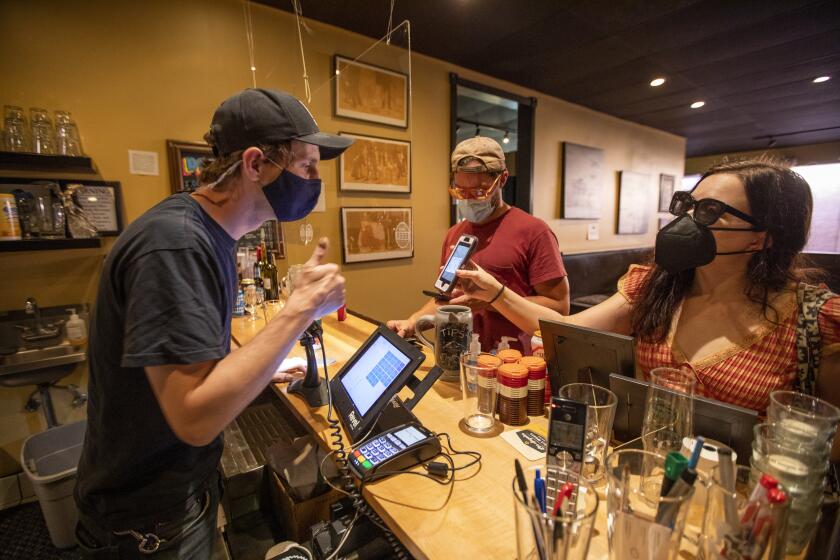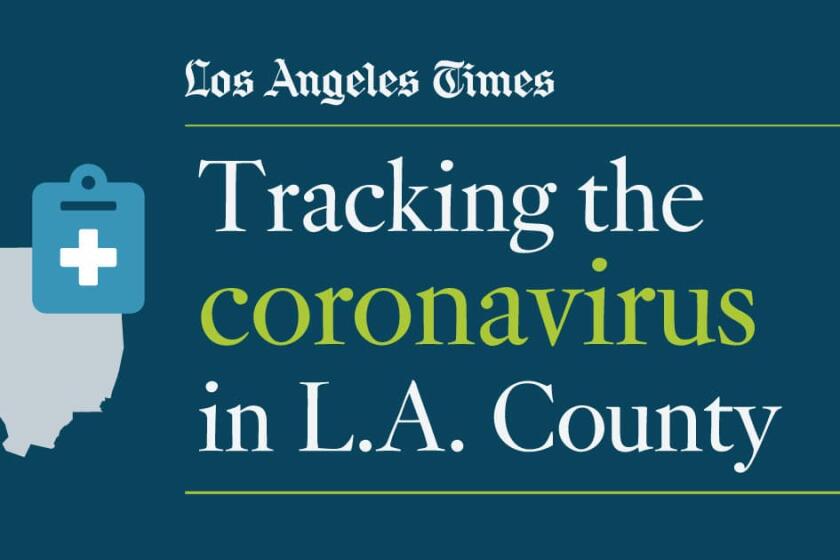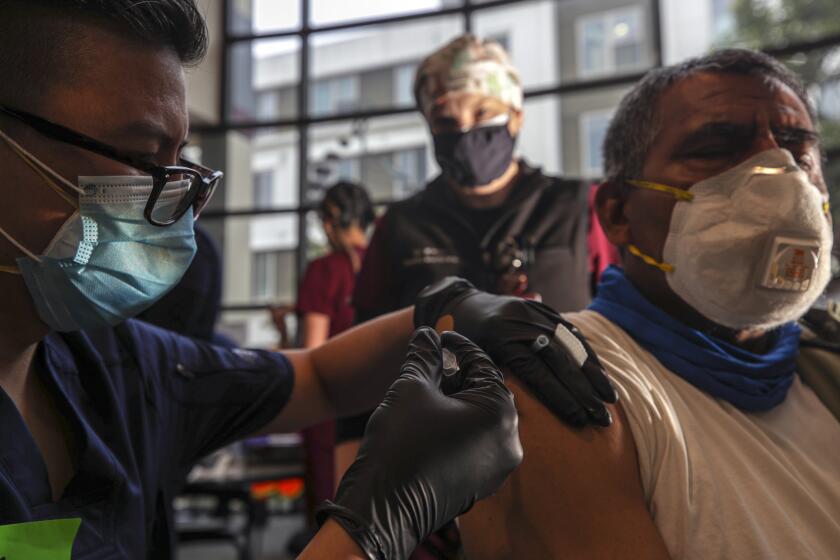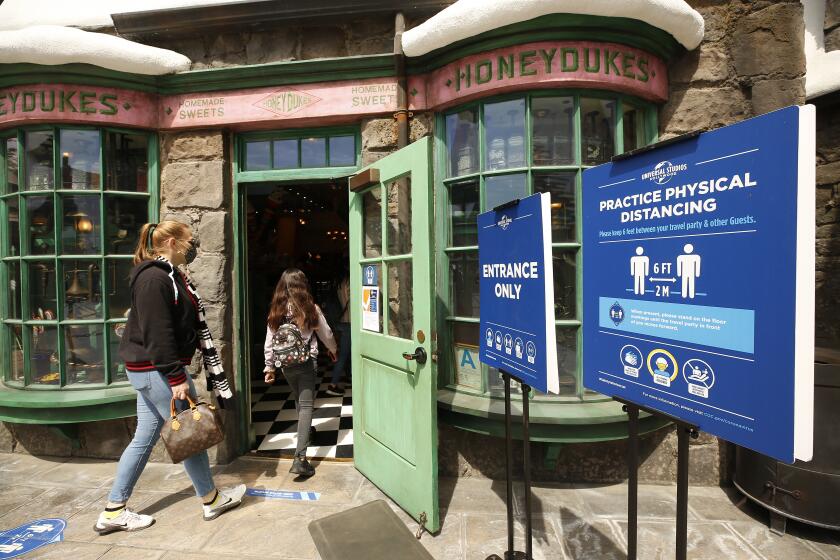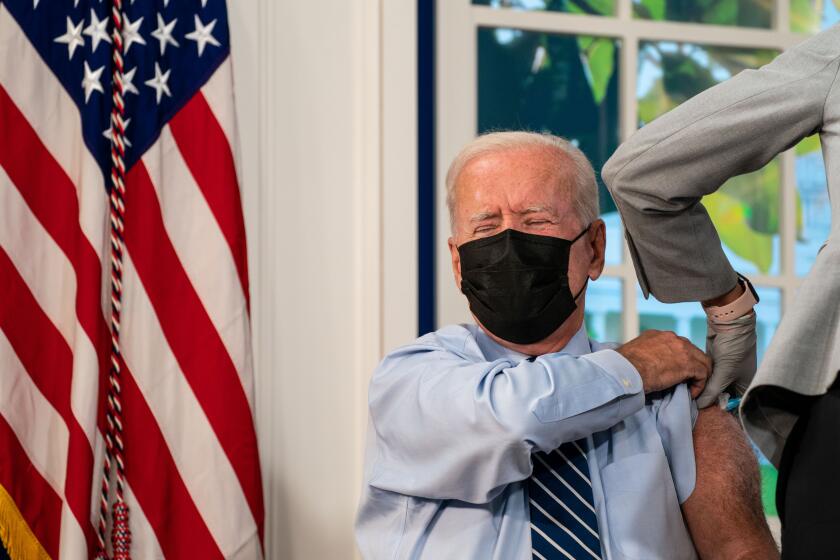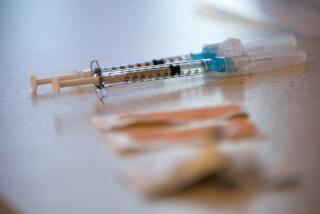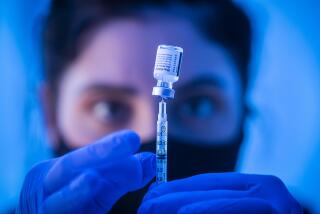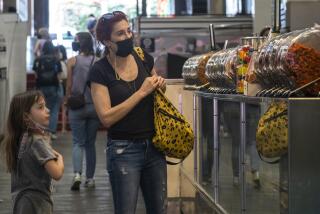L.A. considers sweeping COVID vaccine mandate for restaurants, gyms, malls and salons
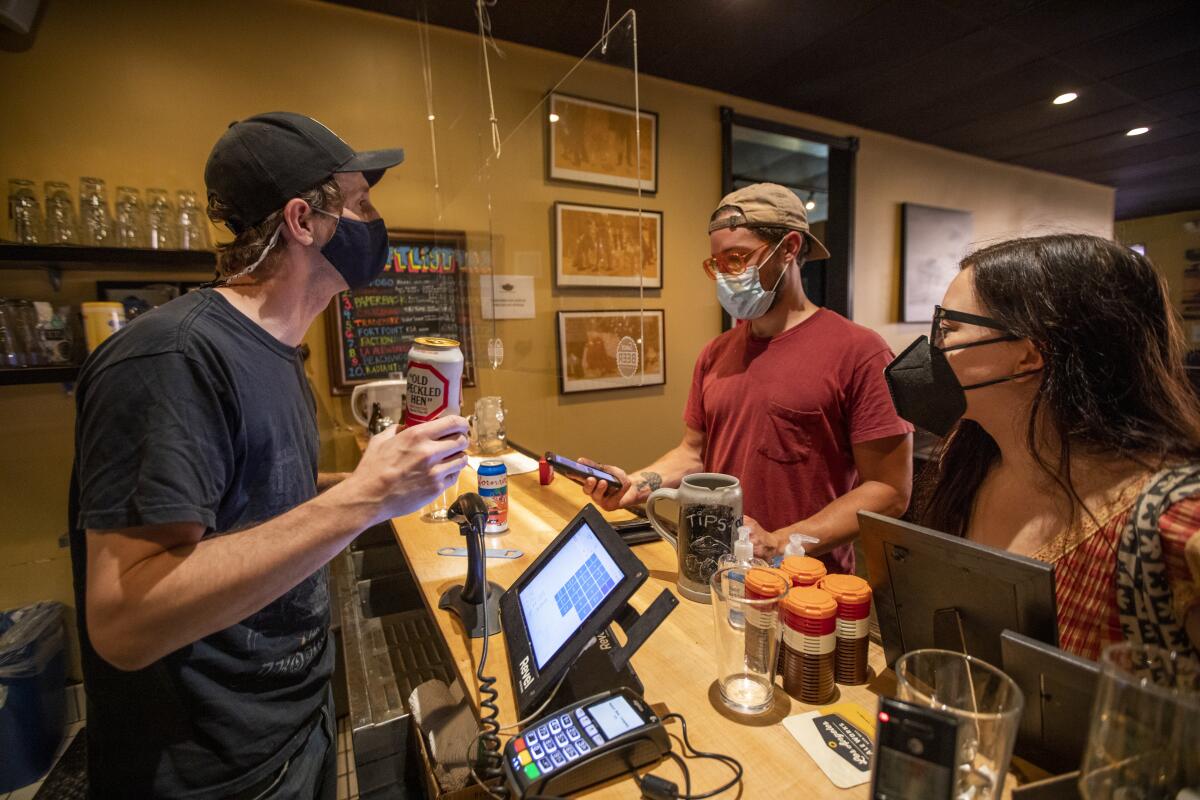
- Share via
Los Angeles leaders on Wednesday will consider a sweeping law requiring adult customers to show proof of full COVID-19 vaccination to enter a wide array of public places, including indoor restaurants, coffee shops, gyms, shopping centers, museums, movie theaters and hair and nail salons.
The plan would be one of the strictest vaccine orders to date — and likely make demonstrating inoculation status part of the daily routine for hundreds of thousands, if not millions, of Angelenos.
The move comes as coronavirus cases and hospitalizations have been falling after a summer surge caused by the highly contagious Delta variant. Officials have credited swift restrictions such as indoor mask rules with helping turn the tide, but officials said more vaccinations are needed to get Los Angeles County to herd immunity. Health experts hope vaccination mandates in public places not only will keep people safe but encourage those who are unvaccinated to get their shots.
Despite the promising trends, health officials stress that the region remains vulnerable to potential new outbreaks — especially with the fall and winter looming.
“We’ve been here before. During early fall 2020, community transmission was low until, then, it wasn’t,” L.A. County Public Health Director Barbara Ferrer said Tuesday. “Last winter was brutal, and given the unpredictability of the virus and the variants, we need to accelerate the pace of vaccinations since this is the most effective tool we have to prevent another deadly surge.”
Additional public places included in the vaccine proposal are bowling alleys, arcades, card rooms and pool halls, as well as personal care establishments such as tanning salons, skin care businesses, tattoo and piercing shops, and massage therapy settings except for treatment of a medical condition.
An exemption to the requirement would be available for people with a “sincerely held religious belief” or a relevant medical condition. But exempt customers must show a recent negative coronavirus test result and a written note attesting to their religious belief or medical condition for entry to the businesses requiring vaccination.
If a business has an outdoor area, people without proof of vaccination could use only that portion of the facility.
Customers who don’t provide proof of vaccination would still be able to enter a business to use the restroom or pick up a takeout order.
A new health order will require proof of COVID-19 vaccination to enter indoor bars, wineries, breweries, nightclubs and lounges in Los Angeles County.
The proposed law also calls for requiring patrons of outdoor events with 5,000 or more attendees to show proof of vaccination or a negative coronavirus test result as of Nov. 4.
It was more than a month ago that the City Council voted to forge ahead with a vaccine-verification law, a move proponents framed as vital both in turning the tide against the Delta variant-fueled coronavirus wave and helping stave off the possibility of future surges.
“If we ever want to get back to normal, to what Los Angeles was like pre-COVID, we need to stop the spread in places most high risk,” Council President Nury Martinez said during an Aug. 11 meeting. “So, if individuals want to go to their gym, go to their local bar without a mask, you need to get vaccinated. And if you want to watch a basketball game, a baseball game, go to a concert at a big venue, or even go into a movie theater, you need to get a shot.”
Council members voted 13 to 0 last month to draft the new rules. Opponents who phoned into that August meeting denounced the plan as overreaching and punitive and argued it would jeopardize L.A.’s economic recovery.
Councilman John Lee, who was absent for the August vote, said on Facebook at the time that he had concerns about the plan, arguing that it would be difficult to enforce, “will negatively impact certain businesses and erode public trust in our ability to combat the pandemic.”
Under city rules, a proposed ordinance is held for one week for a second — typically procedural — vote if the council does not back it unanimously. When asked whether the councilman still has the same concerns with the drafted law, a Lee spokeswoman said Tuesday he was reviewing the language.
The L.A. law also would require vaccination proof to enter indoor city facilities as of Nov. 4, although unvaccinated people would be provided “alternative arrangements for access to government services,” determined on a case-by-case basis.
The latest maps and charts on the spread of COVID-19 in Los Angeles County, including cases, deaths, closures and restrictions.
The trajectory of the COVID-19 pandemic has improved dramatically since the council initially considered the concept.
Over the week ending Aug. 11, L.A. County reported an average of 3,474 new coronavirus cases per day, according to data compiled by The Times. That rolling average has since tumbled to 1,335 new cases per day.
COVID-19 hospitalizations, too, have plunged in recent weeks. On Aug. 11, 1,645 coronavirus-positive patients were admitted countywide. By Monday, that daily census had fallen to 892.
The county has already announced a set of similar, though less stringent, vaccine rules that will go into effect early next month.
L.A. County’s latest health order will require patrons and workers at indoor bars, wineries, breweries, nightclubs and lounges to be at least partially vaccinated by Oct. 7 and fully vaccinated by Nov. 4. That order also strongly recommends, but does not require, such verification for indoor restaurants.
Starting Oct. 7, the county also will require everyone 12 and older to show they’ve either been vaccinated or recently tested negative to attend outdoor events with 10,000 or more people.
The county’s rules apply everywhere except Long Beach and Pasadena, which have their own public health departments. However, those cities have already said they will align their local rules with the county’s.
In step with federal recommendations, a third COVID-19 vaccine dose is now available for eligible residents of Los Angeles County.
In California, cities can pass vaccination laws that are more restrictive than a county order.
The city of Los Angeles’ proposal is similar to an order in West Hollywood, although the smaller city’s rules do not cover malls or museums, nor do they offer exemptions for religious or other reasons. West Hollywood will begin requiring adult customers to show proof of at least one vaccine dose on Oct. 7, and proof of full vaccination starting Nov. 4.
Palm Springs and neighboring Cathedral City have ordered patrons 12 and older to provide proof of COVID-19 vaccination or a recent negative coronavirus test result to enter indoor restaurants and bars.
The steps are prudent, aimed at preventing — or at least lessening — an expected fall or winter wave of the coronavirus, officials say.
In some ways, the proposed Los Angeles rule is more permissive than orders in San Francisco and Berkeley, which do not allow the use of a recent negative coronavirus test result to substitute for the vaccination requirement.
But the proposed L.A. rule covers more businesses than in San Francisco or Berkeley, whose orders don’t apply to malls, salons or museums.
Contra Costa County, the Bay Area’s third-most populous, requires customers of indoor restaurants, bars and gyms to show either proof of vaccination or a recent negative coronavirus test result.
San Jose requires all attendees at large indoor events at city-owned facilities to show proof of full vaccination.
Outside California, New York City requires proof of vaccination to access indoor restaurants, bars, gyms, movie theaters, museums, bowling alleys, arcades, pool halls and play centers.
Biden’s third inoculation comes less than a week after health officials approved the Pfizer-BioNTech booster for certain groups.
To date, 67.7% of L.A. County residents have been at least partially vaccinated for COVID-19, just over the statewide figure of 66.5%, Times’ data show.
But both numbers are well below the threshold experts think is necessary to potentially reach herd immunity, when enough people are protected that the coronavirus is essentially starved of opportunities to spread.
What share of the population would need to be vaccinated to achieve herd immunity from COVID-19 is unknown, and the hyper-transmissibility of the Delta variant — along with slowing inoculation rates — have upended earlier optimistic timelines as to when that could realistically be accomplished. One plausible guess is that 84% of residents of all ages are needed for a community to reach herd immunity, but it is also possible the threshold could be even higher, according to UC San Francisco epidemiologist Dr. George Rutherford.
“You know when you are at herd immunity when the virus doesn’t have an opportunity to go from person to person,” Dr. Anthony Fauci, the U.S. government’s top infectious-disease expert, said during a briefing Tuesday. “But right now, we don’t know what that number is. And when you don’t know what the number is, what do you do? You vaccinate as many people as you possibly can, as quickly and as expeditiously as you possibly can.”
Regardless of the metrics on a countywide or statewide basis, officials remain concerned that the Delta variant could still prey on communities with less-robust vaccine coverage.
“It’s not inevitable that we continue to experience these cycles of scary increases in cases,” Ferrer told the L.A. County Board of Supervisors. “The entire premise of community immunity is to get enough people vaccinated to leave little room for virus transmission.”
Times staff writer Emily Alpert Reyes contributed to this report.
More to Read
Sign up for Essential California
The most important California stories and recommendations in your inbox every morning.
You may occasionally receive promotional content from the Los Angeles Times.
